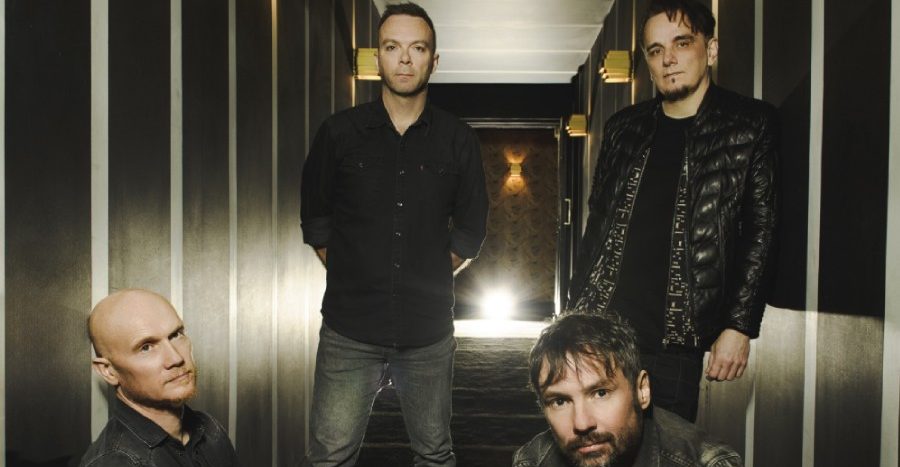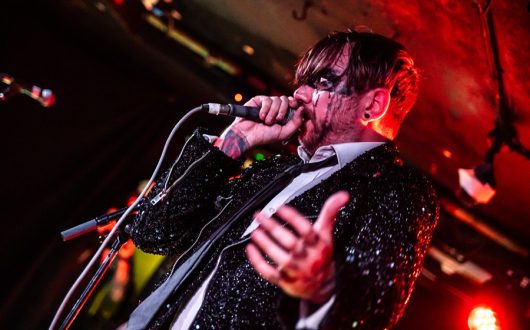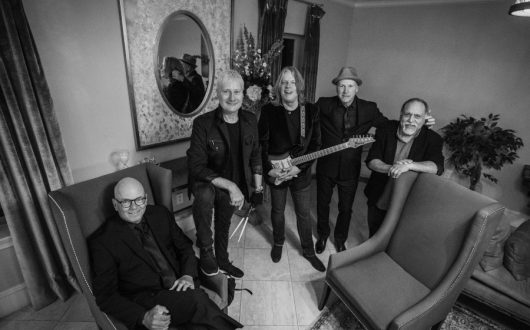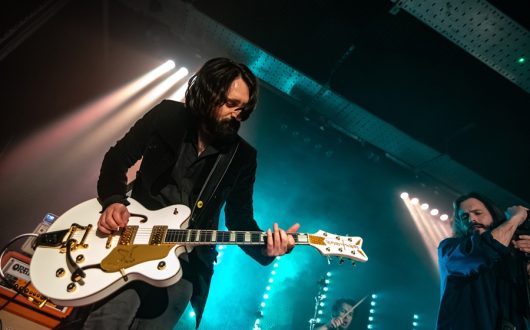Interview by Mark Lacey
It’s 25 years since Bruce Soord extracted himself from the expected path of playing shows to A&R in London, to focus his writing energies and create The Pineapple Thief. Whilst that junction started a solo mission, it quickly built momentum, attracting attention from fans who increasingly wanted to see the music performed live. Since coercing a group of friends to join him on his path, the band have become a formidable force both for their studio material and live shows. Their latest album ‘It leads to this’ may well be their finest hour.
“When I look back, I wonder how the hell I got through it alive. It’s very difficult to make a living out of being a musician. It’s almost like this unattainable dream. You’ve got to have a really forgiving wife, which I was lucky to have. Somehow, we managed to just keep going and get to the tipping point where I was able to go full time”.
MGM: The Pineapple Thief have been around for the best part of 25 years. For much of that time you’ve been relatively underground, but you’ve taken off in the last few years. This originally started this out as a solo project, and it didn’t really become a band for a couple of years. How would you reflect on that journey, and how the band has transitioned to where it is now?
Bruce: It’s quite strange reassessing the whole history of it, because before I started The Pineapple Thief, I was in quite a few bands trying to get a record deal. That’s what I thought we had to do. You had to go to Camden, play to A&R, get a big record deal, and that’s how it was all done. So, I was doing that. I had record label interest; they turned up at gigs and nothing ever happened. This went on for years and years, and I just thought, I’m doing this completely the wrong way. I’m spending more time just chasing this ‘so called’ success, and I’m not actually really making music. So, I threw the towel in, bought some equipment, set up a studio in my house, and started The Pineapple Thief. I played everything myself. Back in 1999, you had to be a bit of a geek to put a studio together; it wasn’t as easy before all this computerised music making kicked off. I had a contact at a label called Cyclops. In the underground prog days, they were a very important little record label. We ended up being their biggest seller and we were shifting maybe 4000 units. In the beginning, I did a song called ‘Private Paradise’. I sent it to Malcolm Barker at Cyclops and said, do you fancy putting this out? He says, yes, it’s great. Bruce, have you got an album? And I was like, no. And he said, have you got a name? And I was like, no. So, I basically wrote the first album. I came up with a name, The Pineapple Thief, after watching this film where a girl steals a pineapple. And then the album came out and it got just enough interest to do another one.
I didn’t want it to look like it was a solo record. I wanted it to look like there were band members, so I made up all these names and put people playing bass and drums, but actually it was all me. And it just carried on like that. It just got slightly bigger, and slightly bigger. And then we were asked to play a gig supporting Caravan in 2003, at a prog festival in Whitchurch. That was when I had to get a band together, which was just my mates. I twisted their arms; just come and do this. After we did the show, there was this huge queue and I asked someone what they were queuing for, and he said, they’re queuing for your merch. Luckily, I’d got a box of CDs in the car. I spent the next hour talking to all these fans, and signing CDs. That was the moment when I realised that there were people out there that actually wanted to listen to The Pineapple Thief. So, it started off as a solo thing, and it carried on for quite a long time, where the studio side of things was just me doing everything.
MGM: The Pineapple Thief changed from being a solo endeavour to being a band almost 20 years ago. How do you reflect back on that change in dynamic?
Bruce: When I look back, I wonder how the hell I got through it alive. It’s very difficult to make a living out of being a musician. It’s almost like this unattainable dream to do what I’ve actually managed to do. But when you’re in this in-between world, where you’ve got this little bit of success, and you can see the snowball rolling, but you’ve got a day job, you’ve got a family, everyone else in the band is in the same position. They can’t commit. You’re going away for ten days to tour around Europe in a van. But it’s a massive undertaking because everyone has to take leave. They’re away from their family, and you don’t come back with any money. So, it’s a really hard sell. You’ve got to have a really forgiving wife, which I was lucky to have. It’s a real chicken and egg thing, because you haven’t got the money or the time to commit to it properly, and because of that, it’s very difficult to get to the next level. Somehow, we managed to just keep going and get to the tipping point where I was able to go full time”.
MGM: You went through that Camden experience because you wanted to be in a signed band, and to be a professional musician. You’ve described some of the harsh realities of that process. But, when did you first realise that was what you were meant to do?
Bruce: I can pinpoint it. I think I was about 13 or 14 years old, and a mate of mine played me ‘Tales of Mystery & Imagination’ by the Alan Parsons Project. When I heard it, it was on this really fancy Linn Sondek system, and the needle went down, and I heard the introduction and the strings coming in and the drums and the rock, and I was flicking through this big gatefold. And I was like, what is this world? Before that, I was into terrible eighties pop. That was the moment. I bought a guitar and I remember thinking, it’s too late; fourteen is way too old, because all my mates could already play grade eight piano and stuff. It took me ages, and I just completely self-taught. But I had this passion that just never left me. This is what really frustrates me about a lot of other artists who are really passionate, but then they give up if nothing happens, and say I’m just going to have to face up to normal life and get a job. But, that’s not how it works. It’s like a dog. It’s for life! It’s just never been an issue for me; the passion just never left. But, that ambition to get the music out to as many people as possible did, and I think still does, require a record label.
MGM: Being a ‘creative’ starts with having something to say, so giving up is not an option. When you started The Pineapple Thief in 1999, what did you want it to say?
Bruce: It started off as this sort of angsty rock, trying to understand the meaning of life and relationships, and I guess that hasn’t really changed too much. Trying to make sense of the world. and about trying to connect these universal feelings that we all have, that we all have to struggle with as human beings. For me personally, when I got the most excited about music and singing, was when it was about things that are so difficult to convey, that the art form is the way to do it. I’m not that particularly articulate when it comes to speaking, and I’ve written some terrible lyrics of my time, but for me, that’s where the power of it is the greatest.
MGM: Your new album ‘It leads to this’ was released on 9th February, and this is your fourteen album. That’s another fantastic milestone. What does the title signify?
Bruce: I’ve lost track of how many, because we’ve done so many live albums and we did the ‘Give it back’ reimagining. I think this is the 14th studio album. It’s quite dark; a little bit apocalyptic in a way, because with the last couple of records, probably starting with ‘Dissolution’, we’re looking at the world and trying to make sense of it. ‘Dissolution’ and ‘Versions of truth’ were really about the polarisation of the world; misinformation, disinformation, whatever you want to call it. And then it just seemed to just keep getting worse and worse. I remember we were touring in 2022 when Russia invaded Ukraine. We were on the bus and it happened overnight, and we were like, what is going on? And then 2024 happens and we’re just about to go on tour, and the world is in an even more precarious place. So, this whole ‘It leads to this’, is very obviously about that. I wish that there was a question mark on the title, because on the flip side of the coin, I’ve still got a real huge faith in human kindness and humanity. I don’t think that we’re all a bunch of assholes that want to kill each other. I think almost all the people I meet are nice people. So, it really doesn’t make any sense. I’m trying to make sense of the world. But when I put it into lyrics and melody, I don’t think about the wars or politics. I actually bring it right back and tell stories about human interaction. So, it’s generally always about the interaction of people and, for me personally, a reassessment of my life. The first track ‘Put it right’ is that kind of thing. On ‘It leads to this’, there’s one lyric that probably sums up the whole record; ‘For all this time, I never noticed you’, which is just effectively an apology to my wife. But even though you can interpret it however you want, that’s what I’m thinking when I sing it. She probably is my muse more than anything. There are quite a few songs that have been inspired by the fact I’ve got a family, and the family is like a lens to the world and what’s happening. So, I kind of frame it around, what are they going to inherit? It’s quite scary.
MGM: Historically, The Pineapple Thief has been your creative outlet, and since you’ve been working with Gavin (Harrison), you’ve done more co-writing. Obviously, he’s been occupied with a number of other projects, not least Porcupine Tree, in the last twelve months, so how did you approach the writing for this album around that?
Bruce: We’ve always had to juggle Gavin a bit. Even before the Porcupine Tree reunion, there was King Crimson, and that’s just something that we just accepted. It’s brilliant to have Gavin in the band. He’s such a creative and talented drummer, as everybody knows. So, what’s happened is the evolution of this current lineup with Gavin. Since 2016, and he effectively joined in 2017-18 for ‘Dissolution’, the relationship has really matured. I’ve got to know Gavin a lot better and to treat him like a regular guy. I must confess, when we first went on tour with Gavin, we paid him as a session guy. And I still thought, “oh my God, look, it’s Gavin Harrison on stage with us. This is brilliant, isn’t it? Wow. It’s Gavin Harrison”. I don’t treat him like that anymore. I just treat him like he’s a drummer in the band. And let’s write some songs, which is quite nice. And it’s the same with John on bass and Steve on keyboards, in that I’ve learnt to completely let go now. So, in terms of songwriting, I come up with most of the melodies, the lyrics, the chord progressions. But I never really finish a song. I always sort of say, right, here’s an idea. I give it to Gavin, and then he’ll tinker with it, chop it around. We normally do it in our studios, just sending it back and forth, which is a nice way to work because there’s less pressure than if someone’s looking over you, going “come on Bruce”. But actually, for this record, we thought it’d be a good idea if we actually do it old school, and sit in a room together. So, I did go to Gavin’s for a few weeks at a time where we would just sit and write together, which was really nice, but intense. My brain was absolutely fried when I finished, but it did create some really good stuff. I remembered specifically ‘Rubicon’ and ‘Every trace of us’; those two tracks were completely written together in its place.
MGM: This album, like many of your previous albums, is very textured, and very emotional. One of your calling cards is your ability to have so much different diversity within a song; moving from beautifully light, to these really complex, heavy patterns. That certainly came through on a number of songs on this album, including ‘All that’s left’. What you were trying to say with that?
Bruce: I remember writing that because I’ve got this baritone acoustic guitar, which is quite an unusual thing. It’s acoustic that goes naturally down to B, but can go lower. The first thing I did was come up with that riff in the middle, which I played on this baritone acoustic. I thought, wouldn’t that be really surprising if you’ve got this track, and it just goes down to this acoustic guitar playing in this register that is traditionally quite metal. It’s one of those things where you look back and think, how did that song come together, and I couldn’t tell you. It just happens. A lot of that is to do with everyone coming in and doing their thing. But emotionally, it was just about understanding what the important things are in life. One of the things I look back on in my life is all the things that you spent way too much energy and time on, that weren’t really that important. You thought they were really important at the time. But the older you get, the wiser you get. Then you realise what you need to do. “All that’s left” (to figure out), was almost like saying, life is really simple. The key to happiness is just the obvious things; be kind, treat the people you love …. spend as much time with them as you can, and all that stuff. Obvious things.
MGM: Two other songs that will be sure to resonate with fans are the opening track, ‘Put it right’ and ‘To forget’. Both of those are really emotionally charged. Are you trying to express overcoming some pain through those songs?
Bruce: It’s exactly that. I think the sentiments are always really quite simple. And I think that’s why the people that do get The Pineapple Thief, really do connect with it. ‘Put it right’ was the first song that I wrote for the record. It was in the middle of the pandemic. I was sat outside my studio and it was a full lockdown, and even a little town like Yeovil has a hum when it’s working, and it was so quiet. There was no traffic. Look in the sky, there’s no vapour trails, there’s blue sky. And it just made me think, wow, this world is so delicate. Humanity just comes to a stop through this virus. And how lucky we were that it wasn’t a super killer zombie virus. It just inspired me to think, oh my God, was I part of the problem? Humanity, were we part of the problem? Can we put it right? We CAN put it right. So, it’s a positive song.
And ‘To forget’, that is quite a difficult song to sing. It is about living with tragedy and for me personally. My wife likes to confront things like that in the open. But I find it really difficult to talk about them. Funnily enough, I can sing about them, but to talk about them is very difficult. I remember seeing this phrase, “remembering isn’t easy, but to forget is impossible”. And I thought, that just absolutely summarises so many things in my mind. It was actually a line about the Argentinians and the forgotten; the people who were kidnapped and never found, and the families, and the pain and torment that they’ve had to go through.
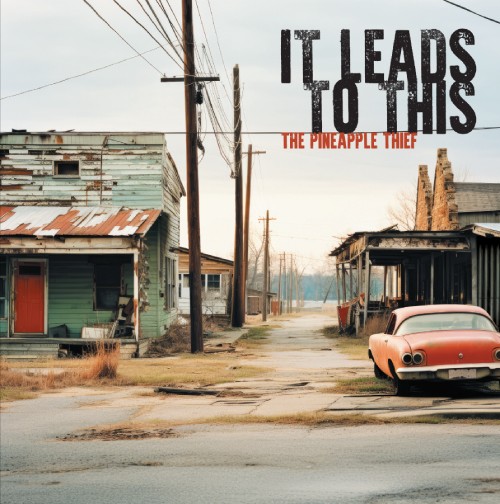
MGM: This album follows your tradition of including additional discs of bonus material, and this time you’ve included an alternative version of the album under the title of “Y Aqui Estamos”. What was the thinking there?
Bruce: I can’t pronounce it. It was a Spanish friend of ours who came up with it. It’s basically the same title, but in Spanish. We’ve always tried to do it and the record label really like to do special editions and to make them special. There’s four discs; a Blu ray with the Dolby Atmos mixes and the surround sound. Previously I’ve done acoustic versions, and string sections, and we’ve had all sorts of orchestral things. But this time we were thinking, what can we do? We didn’t have an awful lot of time. One thing about Gavin, is he’s got a mate that can do anything. He said, “I’ve got a mate who plays really good flamenco guitar. How about we do some reimagining of them and we just rework them, all the instrumentation, but on flamenco guitar, and I’ll play loads of percussion”. And so that’s what we did. It’s really quite out there. I had to re-sing some of them because the vibe changed so much.
MGM: You’ve mentioned the Dolby Atmos mixes, and both you and Steven Wilson have been ambassadors for this sound. Why is that important to you? And how will you translate that into your shows?
Bruce: I got into 5.1 originally because I was mixing a band called Katatonia. In 2012, I did this acoustic tour with them. The label said, can you do 5.1, and I went, yeah, even though I couldn’t. So, I just upgraded my studio and did the mix, and ever since then, I’ve just loved doing the immersive audio. But it is a thing now. The whole thing with experiences that we’re moving to; I don’t think it’s going to replace a traditional rock show, but especially with U2 doing the Sphere thing, and Steven (Wilson) is doing all these playbacks where he shuts the lights off. I actually did the last Jethro Tull album in Atmos, and I went up to Soho Square with Ian Anderson and we just sat there in the theatre. It’s a bit weird in theatres because they’re so big that when you’re mixing things in the roof and stuff, when it’s really big, it can actually sound too far away because it’s nice in a smaller environment. But, yeah, it’s definitely a new thing, the whole experience, as opposed to traditional rock gig.
MGM: The Pineapple Thief will be touring through the UK and Europe from 20th February through to the 16th March, but you’re only doing three dates in the UK this time around. Your last tour in 2021 was really well received, so do you hope to do more shows later this year?
Bruce: I hope we do some more. UK, Germany and USA, they’re still our biggest markets. We’re doing Bristol, Manchester and London. We’re not doing Scotland because we couldn’t get the venue. Sometimes it’s difficult to get the routing, but we always get grief when we announce tours that we don’t play enough places, but I’m hoping there’ll be more.
MGM: There’ll be an expectation on you playing a lot of the new album on this tour. You’ve released the ‘Give it back’ album, where you re-recorded some of the older songs with Gavin, since the last UK/EU dates. Will there be an opportunity to play some more of that material too?
Bruce: Yeah, I think there’s a track on ‘Give it back’ called ‘Last man standing’, the original of which was on ‘All the wars’. So, we’re doing that and ‘Give it back’, the title track off that, and maybe a few others. We’ve got such a large catalogue, and it’s quite a nice problem to have, picking what to play. We’ll definitely be doing quite a few new tracks that people haven’t heard before live.
MGM: You’ve recently completed a successful solo tour through September / October last year. Does that give you an appetite to do more solo shows after this UK/European run is finished? Or will you concentrate on taking The Pineapple Thief back to the US?
Bruce: I think the USA is definitely on the cards. It’s just the budget. Everything is so much more expensive to do, but we’re hoping to do USA later in the year, and to do another European run, so I think it’ll be quite busy with The Pineapple Thief. But I would really like to do another solo tour. It’s proper old school touring in a van, no crew, meeting the crowd, signing CDs at the merch desk. It’s brilliant. It’s completely different; like going back to the old days.
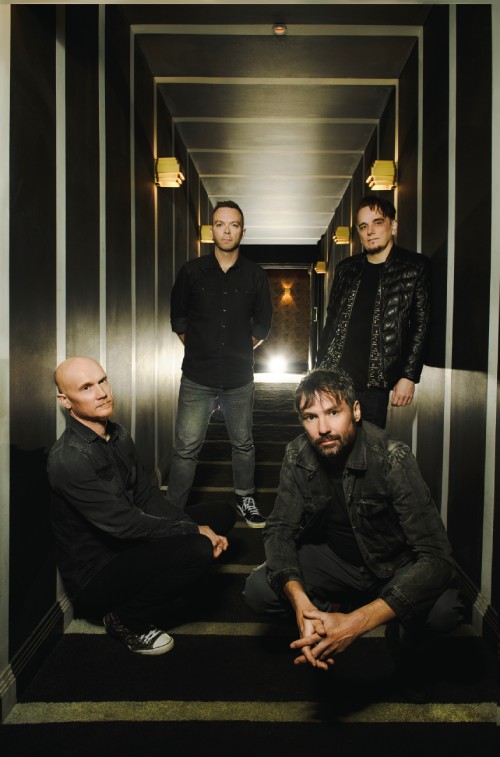
MGM: As the band gets bigger, you’re playing bigger stages, and there is a distance between you and fans. How much do you enjoy going back to those intimate venues?
Bruce: I loved it, and it was intimate. I was effectively having these conversations with people during the show. It was brilliant. Someone said, it’s like watching Bruce doing a lounge show. That’s what it felt like. It’s good to have the two, definitely. I am looking forward to going on a bus because me and John; we self-drove and I think we did 5000 miles in two weeks. We’re old men, we’re not 18 anymore. We were like, urrgghh by the end, but it was good fun!
MGM: You’ve now been doing this for 25 years. What continues to inspire you to write and perform as an artist? And looking back on those decisions you made in the early days, and detaching yourself from that Camden / A&R merry-go-round, has your career now taken the path you expected?
Bruce: I’m just writing about how life progresses, so every day is just inspirational. I don’t think I’m ever going to run out of inspiration for what to write about. In terms of us, all I dreamed of, was just doing a show to 100 people and so to be going out now and playing to over 1000 people, and Amsterdam is just about to sell out at 1300 people, it’s just …wow! It’s great. It was never actually on the radar. The success was never something that I obsessed about. I just obsessed about wanting to get my music out there to as many people as possible. And what we’re doing now is like a byproduct; touring around Europe in a bus, playing to thousands of people. It’s like I say to my old mate John, who I met in 1991; we’ve got to accept that this is brilliant and enjoy it.
The Pineapple Thief’s latest album ‘It leads to this’ is out now through Kscope
For more information:
www.facebook.com/thepineapplethief
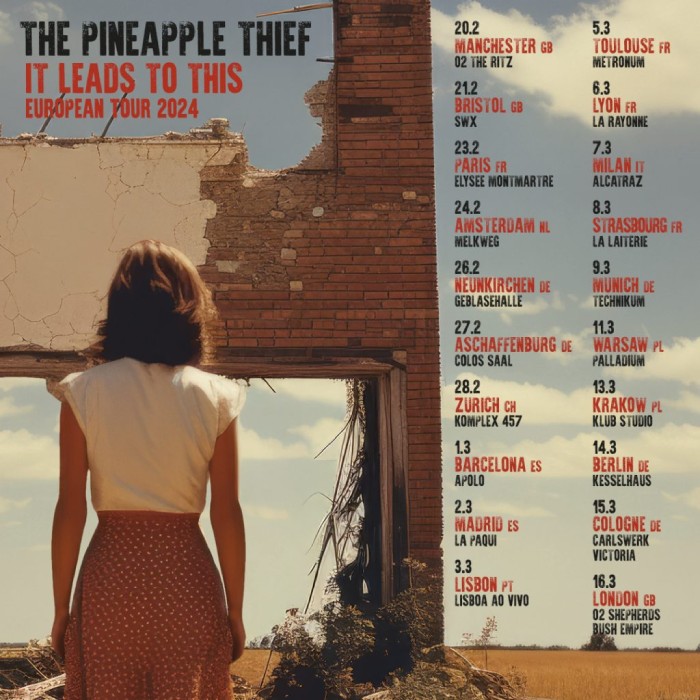
“IT LEADS TO THIS” EUROPEAN TOUR 2024
20/2: Manchester (GB) – O2 The Ritz
21/2: Bristol (GB) – SWX
23/2: Paris (FR) – Elysee Montmartre
24/2: Amsterdam (NL) – Melkweg
26/2: Neunkirchen (DE) – Gebläsehalle
27/2: Aschaffenburg (DE) – Colos Saal
28/2: Zurich (CH) – Komplex 457
1/3: Barcelona (ES) – Apolo
2/3: Madrid (ES) – La Paqui
3/3: Lisbon (PT) – Lisboa Ao Vivo
5/3: Toulouse (FR) – Metronum
6/3: Lyon (FR) – La Rayonne
7/3: Milan (IT) – Alcatraz
8/3: Strasbourg (FR) – La Laiterie
9/3: Munich (DE) – Technikum
11/3: Warsaw (PL) – Palladium
13/3: Krakow (PL) – Klub Studio
14/3: Berlin (DE) – Kesselhaus
15/3: Cologne (DE) – Carlswerk Victoria
16/3: London (GB) – O2 Shepherd’s Bush Empire
